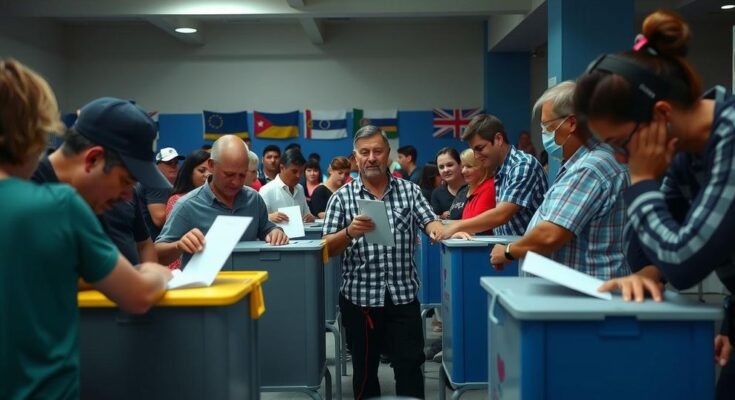Uruguay is holding a presidential run-off between leftist candidate Yamandú Orsi and Álvaro Delgado of the right-wing National Party. The election follows a five-year conservative administration, with a tight race expected amid social and economic challenges affecting voter sentiment. Polling indicates potential fluctuations in support, reflecting broader trends in Latin America concerning incumbent parties’ electoral viability. Initial results are anticipated shortly after polls close.
Voting commenced in Uruguay’s presidential run-off election, featuring the leftist alliance led by former President José “Pepe” Mujica, who seeks to regain power after five years of right-wing governance in the nation. Polls opened at 8 am (11:00 GMT) and are set to close at 7:30 pm (22:30 GMT), with initial results anticipated shortly thereafter.
The electorate of approximately 3.4 million people faces a decision between Yamandú Orsi, the candidate from the leftist Frente Amplio (Broad Front), and Álvaro Delgado of the National Party, part of the outgoing administration led by President Luis Lacalle Pou of the centre-right Republican Coalition. Final opinion polls show a tightly contested race, with less than 25,000 votes potentially separating the candidates.
Uruguay’s political environment remains relatively composed compared to more polarized elections seen in neighboring countries such as Argentina, Brazil, and Mexico. Despite President Lacalle Pou’s substantial 50% approval rating, his coalition has faced criticism regarding their handling of crime, even while overseeing increases in employment and wages.
In the first round of voting held in October, Orsi obtained 43.9% of the ballots for the Broad Front, while Delgado received 26.8%, gaining additional support from the conservative Colorado Party. Orsi emphasizes a commitment to a “modern left” approach, seeking to maintain Uruguay’s traditionally moderate political stance. Delgado appeals to voters by advocating for the continuation of a government he deems effective, despite his inability to run again due to constitutional limits on re-election.
Both candidates are vying for the approximately 8% of first-round voters who favored smaller, unaligned parties, as well as those who abstained from voting previously. However, neither has introduced new proposals in the lead-up to the run-off, leading analysts to conclude that recent televised debates had minimal impact on voter sentiment.
As the year concludes, the international trend of incumbent parties experiencing diminished electoral appeal raises questions regarding Uruguay’s potential divergence from this pattern. Economic challenges, particularly rising inflation and living costs, continue to be pivotal issues influencing voter decisions.
Uruguay’s current presidential election cycle is significant given the contrasting political ideologies entering the run-off. Following five years of right-wing governance under President Luis Lacalle Pou, there is a notable interest in evaluating the return of the leftist Frente Amplio coalition via candidate Yamandú Orsi, backed by revered former President José Mujica. This election reflects broader regional dynamics where economic pressures and governance performance are crucial voter considerations, especially amidst a global trend of incumbent parties facing electoral decline.
The upcoming presidential run-off in Uruguay represents a critical moment for the nation as voters must decide between a leftist alliance seeking to reclaim authority after years of conservative rule and a right-wing candidate aiming to sustain political stability. With economic concerns at the forefront, it remains to be seen whether Uruguay will follow the global trend of reducing support for incumbent governments or maintain a distinct political trajectory.
Original Source: www.aljazeera.com




